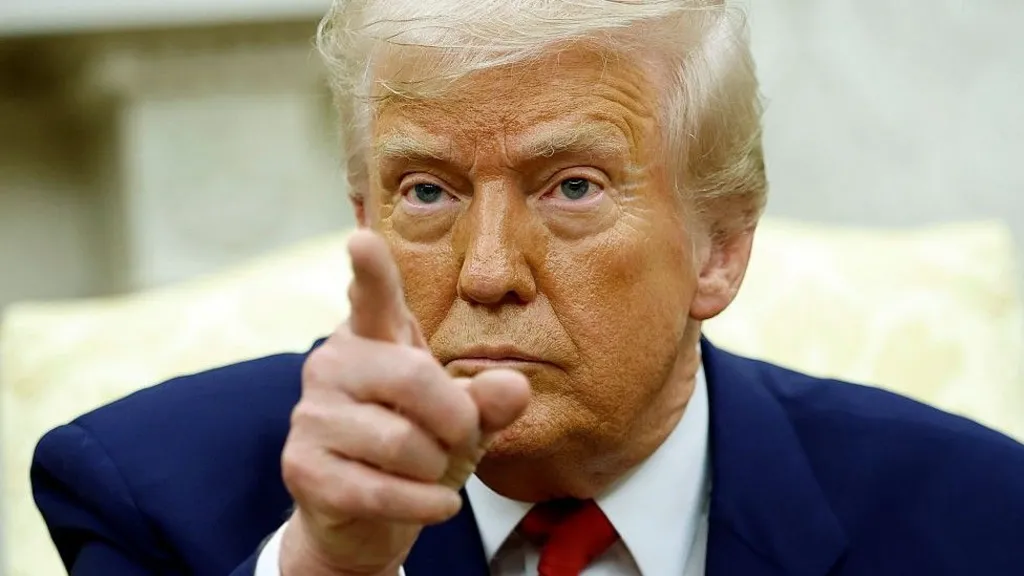
 Getty Images
Getty ImagesUS President Donald Trump has urged Americans to trust in his sweeping tariffs, which have spooked markets and threaten to upend global trade, urging them: "Don't be a PANICAN (A new party based on Weak and Stupid people!)."
He did not clarify who he meant by the term, which he coined in a post on his Truth Social platform on Monday.
The word "PANICAN" could be a portmanteau of "panic" and "Americans", although an alternative theory suggests that it combines "panic" and "Republicans".
A growing number of influential voices within Trump's Republican Party have joined opposing Democrats and foreign leaders in attacking Trump's trade policies, while his officials stand by them.
Trump himself has sought to justify his global programme of tariffs - import taxes - by claiming the US has long been the victim of unfair trading practices, and by vowing that his plan will bring jobs and manufacturing to American shores.
In Monday's online post, he wrote: "The United States has a chance to do something that should have been done DECADES AGO. Don't be Weak! Don't be Stupid! Don't be a PANICAN (A new party based on Weak and Stupid people!)."
He went on: "Be Strong, Courageous, and Patient, and GREATNESS will be the result!"
Although he was reposted by a vocal ally - Congresswoman Marjorie Taylor Greene - Trump has also received some dissent from certain key supporters, including business figures and a top conservative commentator.
Ben Shapiro, the Daily Wire co-founder who has 7.2m YouTube subscribers for his podcast, The Ben Shapiro Show, used Monday's episode to rail against the trade policy of his long-standing ally.
He said Trump's new raft of tariffs that were due to begin on Wednesday could be economically catastrophic, and that the messaging behind them had been muddled.
"The biggest problem here is that the Trump administration has not made clear what they want to accomplish with these tariffs," he said.
Shapiro said there were times when trade barriers could be justified, like to bolster the defence industry or apply pressure on other countries to reduce their tariffs on the US. But they had no merit in themselves, he argued.
"The idea that this is inherently good and makes the American economy strong is wrongheaded; it is untrue," Shapiro said. "The idea that this will result in massive reshoring of manufacturing is also untrue."
Live updates: The latest as as China vows to fight US tariffs
Analysis: Trump's game of chicken over tariffs leaves world guessing
Explainer: What are tariffs and why is Trump using them?
Your questions answered: Stocks, tariffs and pensions
Pete Sessions, a Republican congressman from Texas, said Trump's tariffs had "ignited many capitalists" who were against them.
The agricultural sector in his state was fearful that tariffs would make the price of the food they want to sell uncompetitive, he told BBC Radio 4's Today programme.
"All Texans believe that a tariff is a tax and it's not in America's best interest, nor people in the free world, to pay that extra money."
Other Republicans in Congress who have issued warnings include Senators Ted Cruz and Rand Paul.
They have been joined in recent days by big-name Wall Street figures. Billionaire hedge-fund manager Bill Ackman - who supported Trump in the 2024 presidential election - has warned of "a self-induced, economic nuclear winter".
Even one of Trump's top aides, billionaire businessman Elon Musk, is reportedly against the tariffs, and spent time over the weekend lobbying the president to reverse them, according to two anonymous sources cited by the Washington Post.
The tariffs have been designed to target almost all of the world's countries.
Trump claims that a 10% tariff on all nations and much higher rates on individual countries will boost the US economy and protect jobs.
Companies that bring the foreign goods into the country have to pay the tax to the government.
Goods arriving from China, for example, could be taxed 104% if Trump follows through with an additional rate threatened against Beijing on Monday.
Global stock markets have endured days of turmoil after Trump made most of his announcements on 2 April.
The White House says he does not plan to back down, and have downplayed the risk of a recession that has been prophesied by some economists.